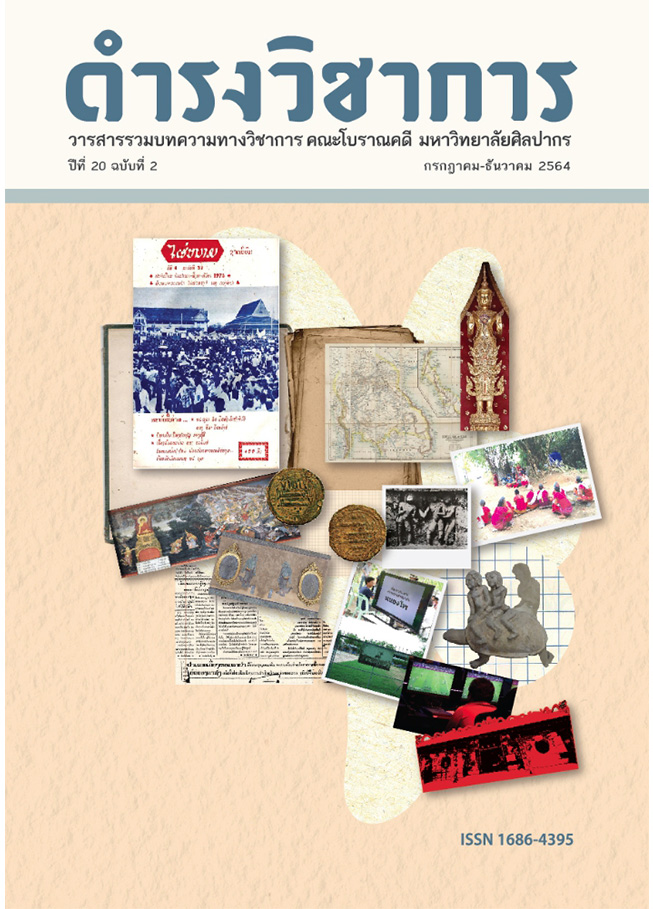ทำความเข้าใจกะเหรี่ยงโปว์ด่านช้างผ่านการท่องเที่ยววัฒนธรรมและชาติพันธุ์
คำสำคัญ:
กะเหรี่ยงโปว์ด่านช้าง, กลุ่มชาติพันธุ์, การท่องเที่ยววัฒนธรรมและชาติพันธุ์บทคัดย่อ
วัตถุประสงค์ของบทความนี้ คือ มุ่งตอบคำถามที่ว่าการท่องเที่ยววัฒนธรรมและชาติพันธุ์ที่จักไม่สร้างผลกระทบให้กับวัฒนธรรมและชาติพันธุ์ควรเป็นเช่นไร เจ้าของวัฒนธรรมควรจัดการท่องเที่ยวเช่นไร และนักท่องเที่ยววัฒนธรรมและชาติพันธุ์ควรท่องเที่ยวอย่างไร ผู้เขียนได้หยิบยกการทำความเข้าใจ “กะเหรี่ยงโปว์ด่านช้าง” ผ่านการทำงานภาคสนามทางมานุษยวิทยาและกรอบคิดการท่องเที่ยววัฒนธรรมและชาติพันธุ์มาเป็นวัตถุดิบในการบอกเล่าและหาคำตอบ ดังผลการศึกษาที่น่าสนใจ คือ การท่องเที่ยววัฒนธรรมและชาติพันธุ์ที่จักไม่สร้างผลกระทบให้กับเจ้าของวัฒนธรรม ต้องได้รับความร่วมมือและตระหนักรู้จากนักท่องเที่ยวและผู้มีส่วนได้ส่วนเสีย นั่นคือ นักท่องเที่ยวควรตระหนักว่า 1) ชีวิตและวัฒนธรรมของกลุ่มชาติพันธุ์มีนัยของการเป็นพื้นที่ส่วนตัว 2) นักท่องเที่ยวเป็นผู้ศึกษาความเหมือนและแตกต่างทางวัฒนธรรม และ 3) การท่องเที่ยวในพื้นที่ทางความเชื่อและพิธีกรรมต้องได้รับการอนุญาตจากเจ้าของวัฒนธรรม ส่วนของผู้มีส่วนได้ส่วนเสียควรตระหนักว่า 1) การพัฒนาการท่องเที่ยววัฒนธรรมและชาติพันธุ์ มิใช่แค่การค้นหา/ฟื้นฟูวัฒนธรรมเพื่อตอบสนองความต้องการของนักท่องเที่ยว 2) การเรียนรู้ในความเหมือนและแตกต่างทางวัฒนธรรม เป็นความหมายที่แท้จริงของการท่องเที่ยววัฒนธรรมและชาติพันธุ์ และ 3) การจัดการผลกระทบที่เกิดขึ้นจากการท่องเที่ยวต้องทำอย่างทันที
เอกสารอ้างอิง
กาญจนา แสงลิ้มสุวรรณ และ ศรันยา แสงลิ้มสุวรรณ, 2555. “การท่องเที่ยวมรดกวัฒนธรรมอย่างยั่งยืน (Sustainable cultural heritage tourism).” วารสารนักบริหาร 32 (4): 139–146.
นัฐวุฒิ สิงห์กุล และ วราภรณ์ มนต์ไตรเวศย์, 2562. พลวัตชุมชนชาติพันธุ์กะเหรี่ยงภาคตะวันตกของไทย ระยะที่ 1 พื้นที่ศึกษา จังหวัดสุพรรณบุรี อุทัยธานี และนครสวรรค์. กรุงเทพฯ: ชุดโครงการศึกษาวิจัยพลวัตของชุมชนชาติพันธุ์เพื่อการสร้างแผนที่วัฒนธรรมมีชีวิต ปีที่ 1 (พ.ศ.2562), สนับสนุนทุนวิจัยโดยศูนย์มานุษยวิทยาสิรินธร (องค์การมหาชน).
สภาปฏิรูปแห่งชาติ, 2558. วาระพัฒนาที่ 1: การพัฒนาดานการทองเที่ยว. กรุงเทพฯ: สํานักการพิมพ สํานักงานเลขาธิการสภาผูแทนราษฎร.
สมทรง บุรุษพัฒน์ และคณะ, 2554. การใช้ภาษาและทัศนคติต่อภาษาและการท่องเที่ยวเชิงชาติพันธุ์ของกลุ่มชาติพันธุ์ในภูมิภาคตะวันตกของประเทศไทย. นครปฐม: สถาบันวิจัยภาษาและวัฒนธรรมเอเชีย มหาวิทยาลัยมหิดล.
------------------------, 2556. การพัฒนาการท่องเที่ยวชาติพันธุ์ไทยโซ่ง : โครงการวิจัยชาติพันธุ์ ภาษา วัฒนธรรม และการพัฒนาการท่องเที่ยวชาติพันธุ์. นครปฐม: สถาบันวิจัยภาษาและวัฒนธรรมเอเชีย มหาวิทยาลัยมหิดล.
สัมภาษณ์
ชนัญ วงษ์วิภาค, 2559. นักมานุษยวิทยาจากคณะโบราณคดี มหาวิทยาลัยศิลปากร. สัมภาษณ์, 25 ตุลาคม.
ลัดดาวัลย์ ปัญญา, 2561. กะเหรี่ยงโปว์บ้านห้วยหินดำ ตำบลวังยาว อำเภอด่านช้าง จังหวัดสุพรรณบุรี. สัมภาษณ์, 27 ธันวาคม.
--------------------, 2562. กะเหรี่ยงโปว์บ้านห้วยหินดำ ตำบลวังยาว อำเภอด่านช้าง จังหวัดสุพรรณบุรี. สัมภาษณ์, 13 มีนาคม.
วันดี เมืองแก่น, 2562. กะเหรี่ยงโปว์บ้านห้วยหินดำ ตำบลวังยาว อำเภอด่านช้าง จังหวัดสุพรรณบุรี. สัมภาษณ์, 14 มีนาคม.
สุดา กองแกง, 2562. กะเหรี่ยงโปว์บ้านห้วยหินดำ ตำบลวังยาว อำเภอด่านช้าง จังหวัดสุพรรณบุรี. สัมภาษณ์, 13 มีนาคม.
ข้อมูลสื่ออิเล็กทรอนิกส์
Nature and characteristics of cultural tourism, 2016. Retrieved November 3, 2016, from http://www.montana-vidin-dolj.com/en/publications/?NewsId=3
Csapó J., 2012. The Role and Importance of Cultural Tourism in Modern Tourism Industry. Retrieved October 11, 2016, from http://www.intechopen.com/books/strategies-for-tourism-industry-micro-and-macro-perspectives/the-role-and-importance-of-cultural-tourism-in-modern-tourism-industry
ดาวน์โหลด
เผยแพร่แล้ว
ฉบับ
ประเภทบทความ
สัญญาอนุญาต
ลิขสิทธิ์ (c) 2021 ดำรงวิชาการ

อนุญาตภายใต้เงื่อนไข Creative Commons Attribution-NonCommercial-NoDerivatives 4.0 International License.
บทความนี้เป็นผลงานของข้าพเจ้าแต่เพียงผู้เดียว และ/หรือเป็นผลงานของข้าพเจ้าและผู้ร่วมงาน ตามชื่อที่ระบุในบทความจริง และเป็นผลงานที่มิได้ถูกนำเสนอหรือตีพิมพ์ที่ใดมาก่อน





